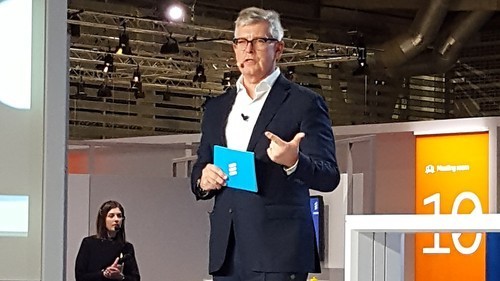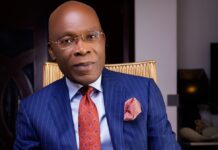Ericsson, a major player in the Nigerian telecommunication sector, has reported an impressive set of results for its first quarter, hailing a double-digit percentage rate of sales growth at its strong networks business, but warned that a US investigation into alleged corrupt practices will land it with “material” financial penalties.
The update on the investigation by the US Securities and Exchange Commission and the US Department of Justice, initially flagged when Ericsson published its third-quarter results last year, came just a day after Chinese authorities launched a separate investigation into the company’s licensing activities following local complaints, and soured what was otherwise one of Ericsson’s best quarters since CEO Börje Ekholm took charge in early 2017.
Having last year warned the US investigation might lead to penalties, Ekholm left investors with no doubt this time round. “We can say that we can rule out that there will be no consequences,” he told analysts on a call this morning.
Corruption Concerns
Borje Ekholm, Ericsson’s CEO, speaks at this year’s Mobile World Congress in Barcelona.
Börje Ekholm, Ericsson’s CEO, speaks at this year’s Mobile World Congress in Barcelona.
In comments included in Ericsson’s earnings report, Ekholm said: “Based on the current status of the discussion it is our assessment that the resolution of these matters will result in material financial and other measures, the magnitude and impact of which cannot be reliably estimated or ascertained at this time.”
Asked on the analyst call why Ericsson is not making a provision for the charges, Ekholm responded: “We have no basis for calculating a number. That is the reason we cannot book a provision.”
Helena Norrman, Ericsson’s soon-to-depart chief marketing officer, told Light Reading that recent settlement discussions with US authorities had provided more certainty about the penalties Ericsson will face, but said she could not go into specifics while the investigation is still underway. “We said then [in the third quarter] that it may be material and now we say it will be. That means it will be significant and is an important matter and we don’t see that it will disappear,” she said.
Table 1: Headline Q1 Results for Ericsson (SEK Billions)
| Q1 2019 | Q1 2018 | YoY change | |
| Net sales | 48.9 | 43.3 | 13% |
| –Networks | 33.5 | 28.6 | 17% |
| –Digital services | 7.8 | 7.3 | 8% |
| –Managed services | 5.9 | 5.9 | -1% |
| Gross margin | 38.4% | 34.2% | 4.2 percentage points |
| Operating income | 4.9 | -0.3 | N/A |
| –Networks | 5.5 | 3.4 | 62% |
| –Digital services | -1.8 | -2.6 | 31% |
| –Managed services | 1.3 | 0.1 | 1200% |
| Operating margin | 10.0% | -0.7% | 10.7 percentage points |
| –Networks | 16.3% | 11.8% | 4.5 percentage points |
| –Digital services | -23.0% | -35.9% | 12.9 percentage points |
| –Managed services | 21.4% | 1.7% | 19.7 percentage points |
| Net income | 2.4 | -0.7 | N/A |
| Free cash flow excluding M&A | 4.1 | 0.7 | 486% |
| Net cash at end of period | 36.1 | 35.6 | 2% |
| Source: Ericsson. |
While details of the affair are scant, Ericsson last year sacked 50 executives after its own internal investigation revealed evidence of corruption dating back to 2007, long before Ekholm’s tenure. According to press reports last year, several “top executives” were involved in a bribery scandal across markets in Africa, Asia, Europe and the Middle East.
The separate Chinese investigation, first reported by the Wall Street Journal, appears to concern the rates Ericsson charges phone makers for the use of its intellectual property. Ericsson revealed in its latest earnings report that its licensing revenues are about 9 billion Swedish kronor ($1 billion) annually — less than the €1.5 billion ($1.7 billion) that Finnish rival Nokia made from brand and patent licensing last year.
While those investigations cast a shadow over the company’s outlook, total sales for the first quarter were up 13%, to SEK48.9 billion ($5.3 billion), and grew by 7% on a purely organic basis, amid signs of a 5G-fueled recovery in the broader market for network services.
There was also an impressive uptick in profitability following several rounds of restructuring and the loss of nearly 17,000 jobs since the end of 2016. Ericsson swung to a net profit of SEK2.4 billion ($260 million), from a loss of SEK700 million ($76 million) in the year-earlier period, and it managed an operating margin of 7.2% excluding gains from the divestiture of some media assets. Its goal is to hit 10% next year.
Investors appeared to brush off any worry over potential fines, with Ericsson’s share price up 3.6% in Stockholm this morning, to SEK92.88, at the time of publication. The company’s shares have risen a fifth so far this year.
But Ekholm warned that margins could take a hit in the short term as “large-scale deployments” of 5G networks get underway in parts of Asia, noting that strategic contracts and 5G field trials had only a limited impact in the first quarter.
“It is no secret that we are taking contracts that can challenge profitability initially but are attractive in the longer term,” he told analysts during the call. “Those will come in the rest of the year more than in the first quarter but at the same time we are not saying we are falling off a cliff. It is a strategic imperative and we will continue to do that.”
He also continued to express concern about the European market outlook, drawing attention to a lack of spectrum, the poor investment climate and “additional uncertainties related to future vendor market access.”
“Regulators are trying to maximize revenues from spectrum auctions instead of considering the macro economic benefits from building out the telecom network,” said Ekholm.
The remarks came amid broader concern about the fees charged for spectrum licenses in Europe. Italian operators last year paid €6.55 billion ($7.4 billion) for new frequencies, while bidding in Germany’s 5G auction is now at more than €5.3 billion ($6 billion), exceeding both analyst and government expectations.
European governments have also come under US pressure to exclude China’s Huawei from their 5G markets, with US authorities arguing its products could include “backdoors” for Chinese government spies. While restrictions on Huawei could translate into more business for Ericsson and Nokia, Ekholm has previously suggested operators are holding back on investment decisions until there is more certainty about suppliers.
You’re invited to attend Light Reading’s Big 5G Event! Formerly the Big Communications Event and 5G North America, Big 5G is where telecom’s brightest minds deliver the critical insight needed to piece together the 5G puzzle. We’ll see you May 6-8 in Denver — communications service providers get in free!
Despite those concerns, sales at Ericsson’s networks business were up 17% in the first quarter compared with the year-earlier period, to SEK33.5 billion ($3.6 billion), and they rose 10% in organic terms. Ericsson attributed the growth largely to activity in North America and North East Asia, where operators are investing in new 5G infrastructure.
The Swedish company also said it expects the market for radio access network equipment to grow 3% this year, up from a previous forecast of 2%.
Ericsson’s forecast comes a day after Huawei predicted that its own sales to carriers would grow at a double-digit percentage rate this year, after declining about 1% in 2018. Nokia has yet to provide updated guidance but is due to publish its own first-quarter report next week.
Digital difficulties
There was gloomier news from Ericsson about the long-suffering digital services unit, which continues to rack up losses despite restructuring efforts. Sales were stable in organic terms but grew 8% on a reported basis, to SEK7.8 billion ($850 million), compared with the year-earlier quarter, while the operating loss narrowed from SEK2.6 billion ($280 million) to SEK1.8 billion ($200 million) over the same period.
Ericsson is renegotiating or exiting 45 contracts it deems non-strategic or “critical” in a bid to restore profitability at the unit and said it has now addressed 25 of those deals. But it has also been hit by additional impairment charges after scrapping Revenue Manager, a business support systems (BSS) product that failed to gain any market traction.
Ekholm blamed some contraction in the digital services gross margin — which shrank three percentage points, to 36.8%, compared with the year-earlier period — on an “unusually high software portion” in the sales mix but said he was confident about hitting a “low single digits” target for the operating margin in 2020. “We have good momentum in the market and with a fairly large number of wins in the quarter, we are increasingly confident about the recovery plan we’ve put in place,” he said.
At the managed services division, sales fell 1% compared with the year-earlier quarter, to SEK5.9 billion ($640 million), but dropped 5% in organic terms. Despite that decline, operating income soared from just SEK100 million ($11 million) to SEK1.3 billion ($140 million) over the same period.
The improvement was driven partly by the reversal of a provision for impairment of trade receivables, said Ericsson in its earnings report, but also stemmed from an increase in the gross margin following restructuring activities.
About 8,000 of Ericsson’s job cuts in the last couple of years have come at the managed services business, affecting more than a fifth of employees, as Ericsson has shifted resources into R&D, exited unprofitable contracts and made investments in automation.
Ericsson spent SEK9.2 billion ($1 billion) on R&D in the first quarter and has ringfenced this part of its business from the cutbacks happening elsewhere. “I don’t believe R&D will be efficient if levels fluctuate too much,” said Ekholm. “We made a significant increase in levels to make sure we have a competitive portfolio and you should not expect it to start fluctuating up and down — we will be much more stable going forward.” Mobile World Live












